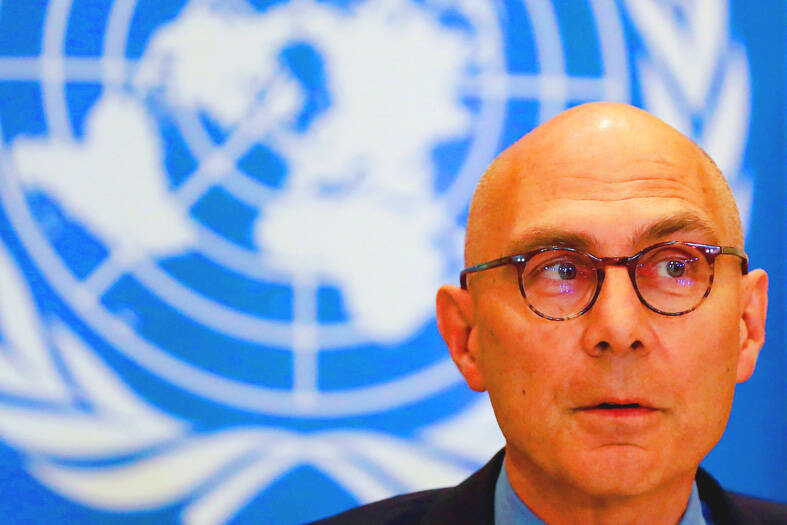Hundreds of thousands of people are being coerced in Southeast Asia by criminal gangs into carrying out online scams, often under the threat of torture, the UN said yesterday.
Many have been trafficked into working in online criminality and face serious threats such as torture or sexual violence, the UN said in a report.
“People who are coerced into working in these scamming operations endure inhumane treatment while being forced to carry out crimes,” UN High Commissioner for Human Rights Volker Turk said. “They are victims. They are not criminals.”

Photo: AFP
The scale of the scourge in Southeast Asia is difficult to gauge, because of the practice’s clandestine nature and gaps in the response by authorities, the report said.
However, it said credible sources said that at least 120,000 people across Myanmar could be held in situations where they are forced to carry out online scams.
Estimates in Cambodia are at about 100,000, it said.
Laos, the Philippines and Thailand are among other nations in the region identified as the main countries of destination or transit.
The scam centers generate revenue amounting to billions of dollars a year, the UN said.
Victims come from across the ASEAN region, Taiwan, China, Hong Kong, South Asia and further afield from Africa and Latin America.
Most people trafficked into the online scam operations are men, although women and teens are also victims, the report said.
The illicit networks benefited from the COVID-19 pandemic, which in some countries saw casinos closed under public health measures.
This led to casino operators moving to less regulated spaces, including conflict-affected border areas, and online, the report said.
The COVID-19 crisis also left many migrants more vulnerable, stranded in countries and out of work due to border and business closures.
Lockdowns also saw people spending more time online and susceptible to becoming targets of online fraud, the report said.

VAGUE: The criteria of the amnesty remain unclear, but it would cover political violence from 1999 to today, and those convicted of murder or drug trafficking would not qualify Venezuelan Acting President Delcy Rodriguez on Friday announced an amnesty bill that could lead to the release of hundreds of prisoners, including opposition leaders, journalists and human rights activists detained for political reasons. The measure had long been sought by the US-backed opposition. It is the latest concession Rodriguez has made since taking the reins of the country on Jan. 3 after the brazen seizure of then-Venezuelan president Nicolas Maduro. Rodriguez told a gathering of justices, magistrates, ministers, military brass and other government leaders that the ruling party-controlled Venezuelan National Assembly would take up the bill with urgency. Rodriguez also announced the shutdown

Civil society leaders and members of a left-wing coalition yesterday filed impeachment complaints against Philippine Vice President Sara Duterte, restarting a process sidelined by the Supreme Court last year. Both cases accuse Duterte of misusing public funds during her term as education secretary, while one revives allegations that she threatened to assassinate former ally Philippine President Ferdinand Marcos Jr. The filings come on the same day that a committee in the House of Representatives was to begin hearings into impeachment complaints against Marcos, accused of corruption tied to a spiraling scandal over bogus flood control projects. Under the constitution, an impeachment by the

Exiled Tibetans began a unique global election yesterday for a government representing a homeland many have never seen, as part of a democratic exercise voters say carries great weight. From red-robed Buddhist monks in the snowy Himalayas, to political exiles in megacities across South Asia, to refugees in Australia, Europe and North America, voting takes place in 27 countries — but not China. “Elections ... show that the struggle for Tibet’s freedom and independence continues from generation to generation,” said candidate Gyaltsen Chokye, 33, who is based in the Indian hill-town of Dharamsala, headquarters of the government-in-exile, the Central Tibetan Administration (CTA). It

A Virginia man having an affair with the family’s Brazilian au pair on Monday was found guilty of murdering his wife and another man that prosecutors say was lured to the house as a fall guy. Brendan Banfield, a former Internal Revenue Service law enforcement officer, told police he came across Joseph Ryan attacking his wife, Christine Banfield, with a knife on the morning of Feb. 24, 2023. He shot Ryan and then Juliana Magalhaes, the au pair, shot him, too, but officials argued in court that the story was too good to be true, telling jurors that Brendan Banfield set